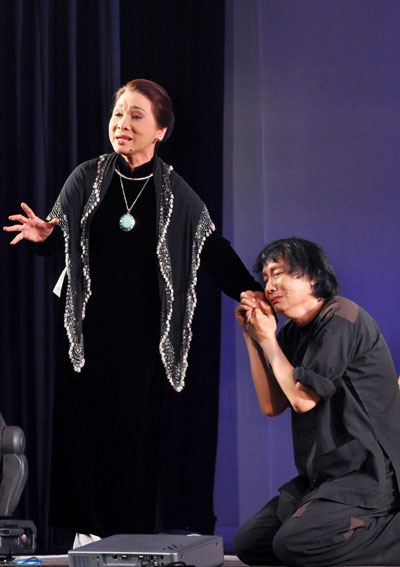 Life & Style
Life & Style

The cải lương (reformed opera) play Đời Cô Lựu (Life of Ms Lựu) a production by well-known scriptwriter Trần Hữu Trang, will be restaged in a new version 40 years after its first release.
 |
| People’s Artist Bạch Tuyết (right) performs in the cải lương play Đời Cô Lựu, which will be restaged in a new version of cải lương and bolero in HCM City. Photo courtesy of the organiser |
HCM CITY — The cải lương (reformed opera) play Đời Cô Lựu (Life of Ms Lựu), a production by well-known scriptwriter Trần Hữu Trang, will be restaged in a new version 40 years after its first release.
The 90-minute play portrays Lựu, a Vietnamese woman, her challenges and sufferings under the feudal society in the south. It also features the themes of love and unfaithfulness.
Producer Gia Bảo worked with his partner, People’s Artist Bạch Tuyết, to complete the new version, a mix of cải lương and bolero, a genre of slow-tempo Latin music.
Bảo invited Tuyết and Vietnamese-American actress Phượng Liên, one of the region’s most talented cải lương performers in the 1980s and 90s, to play the leading character, Lựu.
He also used pop stars Cẩm Ly and Lệ Quyên, both are famous in bolero, to play supporting roles.
“Our new version is targeted to young audiences,” said Bảo, who spent more than VNĐ800 million (US$35,000) on production.
“We want to offer cải lương with a new style to encourage young people to learn more about Vietnamese history and culture through theatre,” he added.
Since its debut by Thanh Minh-Thanh Nga Troupe, the play has been staged many times by art troupes in HCM City and southern provinces.
It is considered a canon of cải lương, a Vietnamese drama originating in the 1900s, developed in the Mekong River Delta region.
Scriptwriter Trang was born in 1906 to a farming family in Chợ Gạo in Mỹ Tho Province (now Tiền Giang). He began his professional career in 1928, working for leading troupes owned by Năm Phỉ and Năm Châu, great veterans of cải lương.
In the 1930s, Trang was at the peak of his artistry and fame, trying to put his new ideas in serious plays such Khi Người Điên Biết Yêu (When the Madman Loves), Tìm Hạnh Phúc (Seeking Happiness) and Lan Và Điệp (Love Story of Lan and Điệp).
After the August Revolution in 1945, Trang joined the revolution and worked in Sài Gòn-Chợ Lớn. He was a member of the National Front for the Liberation of the South. He died in 1966 in battle. His body has never been found.
Trang created more than 30 works and all feature Vietnamese characteristics. Most of them have been recognised as canonical cải lương and have been staged many times by different generations at home and abroad.
His plays starred Phùng Há, Thanh Nga and Út Trà Ôn, who are recognised gurus of the theatre. For his contributions, he was awarded the Hồ Chí Minh Prize by the Government in 1996.
Đời Cô Lựu will be restaged for two nights, January 21 and 28, at the Bến Thành Theatre, 6 Mạc Đĩnh Chi Street, District 1. Tickets are available at the box office. — VNS









